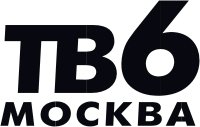TV-6 (Russia)
| TV-6 ТВ-6 |
|
|---|---|
 |
|
| Launched | 1 January 1993 |
| Closed | 22 January 2002 |
| Network | MIBC (Moscow Independent Broadcasting Corporation) |
| Owned by |
Boris Berezovsky (85% stake) Lukoil-Garant (15% stake) |
| Picture format | SECAM (576i 4:3) (SDTV) |
| Country | Russia |
| Broadcast area | Russia |
| Headquarters | Moscow, Russia |
| Replaced by | NTV Plus Sport (Moscow), Euronews (Other Regions of Russia), TVS, Russia-2 (former RTR-Sport) |
| Website | http://tv6.ru (defunct) |
|
Availability
|
|
| Terrestrial | |
| Moscow & Moscow Oblast | 6 |
| Other Russian regions (with 1997) | 3 (RTR-2) |
| Satellite | |
| Cable | |
| Mostelekom | 6 |
TV-6 (Russian: ТВ-6) was one of the first commercial television stations in Russia. It began broadcasting in 1993, and was closed on 22 January 2002. Its frequency has eventually passed to Sport TV.
The channel was founded in 1992, by the holding of Eduard Sagalaev, Ted Turner and VID company. It started broadcasting on 1 January 1993. Until 1994 TV-6 shared time with a minor channel "North Crown" (Северная корона), which was closed a year later.
It was originally an entertainment channel which broadcast talk shows, cartoons, music and series. TV 6 was the first in Russia to air foreign sci-fi series such as Babylon 5, Lexx, First Wave, as well as sitcoms Grace Under Fire and 3rd Rock from the Sun. Until 1996 TV-6 aired no news.
In 1999, 75% of TV6's stock was sold to media oligarch Boris Berezovsky. Channel's policies gradually changed from entertainment to political journalism. In April 2001, after NTV channel was bought by the government gas monopoly Gazprom, several prominent NTV journalists, including Yevgeny Kiselyov, and other employees left to join the TV-6 staff.
After the change of staff Lukoil in May 2001 started the court battle over bankruptcy which the station lost on 11 January 2002, and was put into liquidation unanimously by 14 judges sitting in the supreme arbitration court, overturning a 29 December 2001 lower appeal court decision reviving the channel and ordering a new hearing of the bankruptcy application. Two lower arbitration courts had decided against the network last in the fall of 2001.
...
Wikipedia
